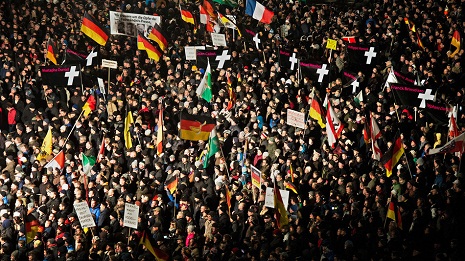Each week, they have gathered to air their gripes about refugees, immigrants and Islam’s growing presence in Germany. The movement has drawn more than 25,000 to a single march at its peak and has spread as far as the UK, where a rally is scheduled for Feb. 28.
After the deadly attacks in France, which were executed in the name of Islam, the massive crowd descended on Dresden, the movement’s stronghold. Though the gathering was called to honor the victims, the xenophobic overtones were hard to miss. the xenophobic overtones were hard to miss.
Against the backdrop of baroque towers and monuments that were previously the main draw to this stunning city, demonstrators raised crosses and German flags.
Among tributes to Marine Le Pen, queen of the French far right, was an image of German Chancellor Angela Merkel in a photoshopped hijab.
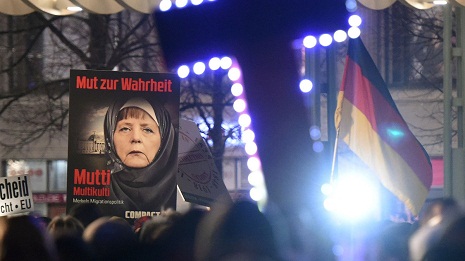
Men and women, skewing middle-aged and entirely white, complained about the powers-that-be allowing so many immigrants, especially Muslims, into Germany.
Younger counter-demonstrators, meanwhile, shouted above the heads of riot police and volunteer security guards, who wore white armbands that called Nazi uniforms to mind.
“Refugees are welcome here!” they screamed.
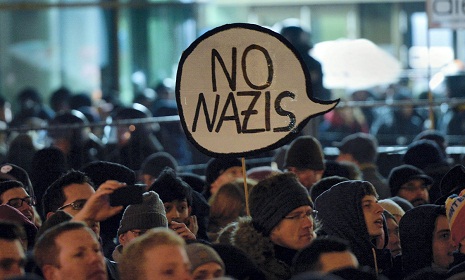
On the south side of the city, a refugee from Eretria was found stabbed to death the following morning. Though his roommate was eventually identified as a suspect, the timing of the attack raised fears that the new movement could be fueling violence against outsiders.
Echoes of darker days
Launched on Facebook in October, the group, which calls itself the Patriotic Europeans Against the Islamization of the West (or Pegida, by its German acronym), was initially scorned as a far-right triviality.
But when the online movement spilled into the streets of Dresden and rapidly generated smaller spinoffs, mainstream Germans went to war. Deeply scarred by their country’s Nazi past, they have long shrunk from overt symbols of nationalism and fought fiercely to stamp out any ghosts from the past.
So they did the same with Pegida, organizing even larger counter-protests, and in one case, preventing Pegida from marching at all. Chancellor Merkel chimed in as well, urging Germans to keep their distance from the “prejudice” group, and later adding that Islam was a part of Germany.
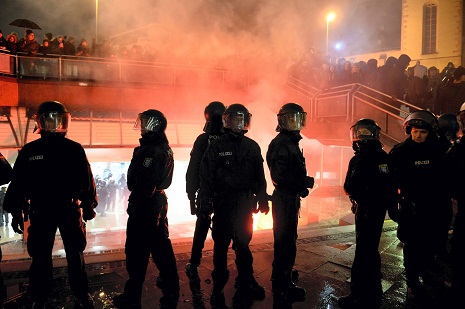
Meanwhile, the German media dug into Pegida’s leadership exposing the ringleader’s criminal record (cocaine, burglaries, drunk driving) and finally doing him in by unearthing a photo that showed him posing as Adolf Hitler.
On the heels of his departure, other leaders also stepped down, forcing the group to cancel what would have been its 13th march on Dresden. But whatever its fate, the group has already left a significant mark.
Its list of demands — new immigration laws, a beefed-up police force and the “speedy expulsion of Islamists,” to name a few — have made it into conversations well beyond radical circles. An up-and-coming political party, seemingly emboldened by the sight of thousands in the streets, has become more vocal about its own not-PC-views on immigration.
Aware of Pegida’s stigma, many more have chosen to stay away from its marches, but have been quietly cheering from the sidelines, finding something that resonates with its complaints.
"Do people think Pegida fell from the sky?" asked Edith Sauberlich, editor of a Dresden newsletter who was borrowing the question from an anonymous letter she received.
The soft-spoken 63-year-old woman has spent most of her adult life working with the poor, and like the anonymous writer, was not surprised to see how quickly the movement took off.
A weary city ripe for radicals
Dresden is a city in the former communist east of the country, where wages and employment levels still lag behind those in the west.
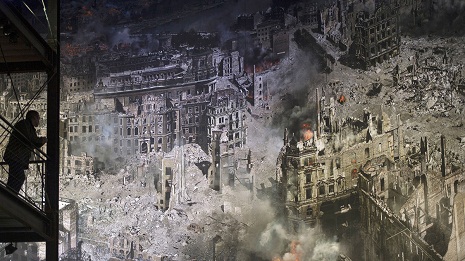
Pegida launched at a time of anxiety over Germany’s role as the bailout savior of Southern Europe. It began as Germany confronts the reality of having one of the fastest-aging populations in Europe that is struggling to maintain the generous social benefits that have long been a staple of its system.
Then came the refugees.
More than 200,000 arrived in 2014 alone, according to Germany’s interior ministry, marking a 60 percent increase from the previous year.
The war in Syria, now in its fourth year, has contributed to the spike, as has instability from Afghanistan to North Africa. Germany, which offers refugees monthly stipends, medical care and other benefits those in poorer countries could only dream of, has become the top European destination for asylum-seekers. The number of applicants is only expected to grow.
As refugees pour in, Germany has been distributing them throughout its 16 states. Some have landed in cosmopolitan areas, while others have wound up in places like Dresden, which has virtually no immigrant population to speak of.
To Pegida fans, this spike has elicited unanimous concern. The uglier voices rail against the influx of "criminal" Muslims, as most refugees are coming from Muslim countries. The more sympathetic express fear at the prospect of adapting to yet another change.
Sauberlich relates most strongly to this camp — though, when her older sister told her that a “giant man; definitely a foreigner” frightened her on a subway platform in Berlin, Sauberlich remembers thinking, “these Pegida people might have a point.”
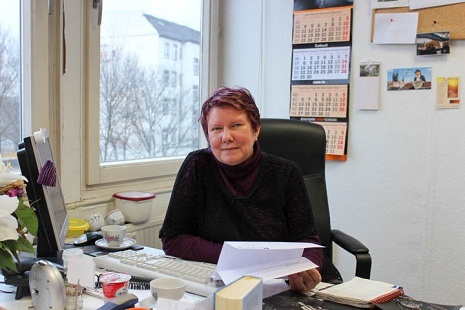
She was nearly 40 when the Berlin Wall came down, turning her world on its head.
“Since 1990, not one stone remained on top of another,” Sauberlich said, describing the breakneck changes that have transformed her city and her life since the end of communism.
Over the last 25 years, she adjusted to a new currency twice, adapted to new infrastructure and new ways of life. Now that`s she`s approaching retirement, Sauberlich hopes adapting has come to an end.
"You develop some longing for some peace and quiet, for some normality to return. Now we get all these foreigners and where do they go?" she asked. “I can fully understand the people’s worries.”
Much of Pegida’s refugee-phobia derives from lack of information, according to Frank Richter, a former priest who has taken on the role of Dresden’s Pegida mediator.
Now the director of a government organization dedicated to public political education, he responds regularly to Pegida supporters hysterical over the prospect of receiving refugees or immigrants in their town.
“There is a lot of screaming,” Richter said.
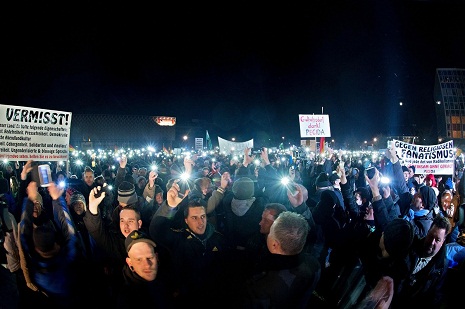
He tries to calm their anger by explaining where refugee financing comes from and assuring them that newcomers won’t take food off their plates.
In one case, residents of a village outside of Dresden were outraged that a public pool was closing at the same time a housing complex for refugees was going up. Richter had to explain that one was financed by the state, while the other was financed by the federal government. The refugees were not taking away their swimming pool.
"People couldn’t understand this right away," he said. "You have to explain the legal side you have to explain the financial side."
But there are some he has not been able to reach.
Fear of Islam
Many have hard biases against Muslims, ranging from wariness to hate. Some want to put a firm stop to the changing demographics of Germany’s predominately Christian population, while others fear the real threat of radical Islam.
Since the war in Syria began, more than 500 Germans have traveled to Syria to fight, igniting fears that, one day, they might launch attacks back home. These fears reached a fever pitch after the France attacks in January.
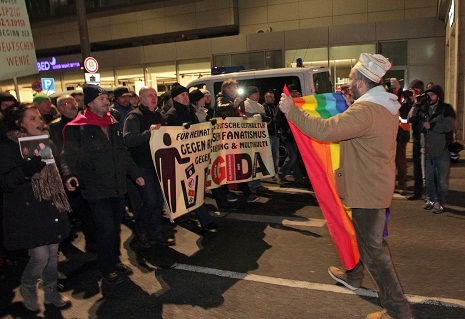
Yet even in liberal cities with well-established immigrant communities, Pegida sympathizers are not hard to find.
Many are rallying behind the Alternative for Germany or AFD, the up-and-coming political party that launched in 2013 on an anti-Euro platform.
Since then, the party has taken a stance on social issues that notably overlap with some of Pegida’s demands. Its politicians have raised eyebrows by proposing referendums on the building of mosques with minarets, while slamming the country’s immigration policies.
Gotz Fromming, an AFD representative from Berlin, calls the party an “early-warning system” about everything from possible financial doom to an impending “clash of cultures” that, to his mind, has already begun.
“The German media chooses not to write about the clashes and fights happening between police and aggressive clans with an immigration background,” he said. “In most cases they don’t write the nationality of the criminals [...] because they fear German people might have a bad feeling about people from these groups. But in the long term, this leads to a mistrust in our government and media.”
The forbidden right
Despite their conservative social views, both AFD members and supporters are quick to say — like the Pegida crowd — that they are not right wing.
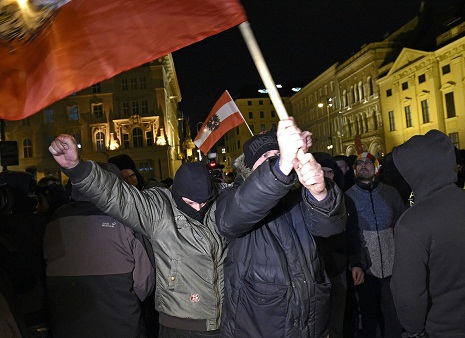
"Hitler was right wing," said Valerie Magnis, a 30-year-old AFD supporter from Berlin."Because of our history, there are many things that are forbidden in Germany. This includes being on the right and saying anything bad about Muslims."
The AFD though, which has seats in several state parliaments and in the European Parliament, is testing the second rule.
Magnis appears to be testing it, too. She’s had a lot of time to think about Islam and refugees, unlike many who take to the streets of Dresden. For four and half years she worked alongside Muslims and with Syrian refugees through a Catholic charity, bouncing between Rome, Berlin and Beirut, where she picked up Arabic.
When she returned to Berlin, she continued voicing support for Syrian refugees, who accounted for 20 percent of those who applied for asylum in Germany last year. But she also became more critical about other refugees, who, in her eyes, are in Germany only for economic reasons and should never have been allowed in in the first place.
She also began grappling with her own views on Islam’s growing presence in Germany. There were more than 4 million Muslims in the country in 2010, representing about 5 percent of the population. That number is projected to top 5.5 million in the next 15 years. Asked for her take on the matter, she paused, seeming to carefully gather her words.
“The first necessary step is to acknowledge that we have different cultures from Arabs and Muslims and that this creates problems that we do not experience with, for example, the Japanese,” she said.
“If I were a politician, this would cost me my hat,” she added. “But the people in Dresden are nodding. They are in the streets saying, ‘Yes, this is a problem.’”
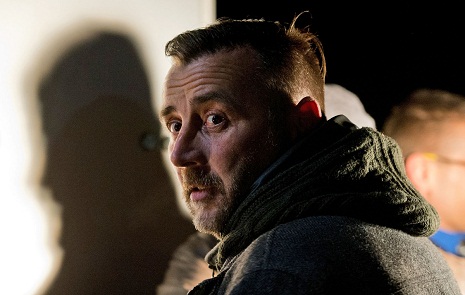
She doesn’t offer a second step. It seems that all but the most fringe actors — like Lutz Bachmann, the now ex-boss of Pegida — have gone as far as proposing “solutions” to Germany’s “Islamization problem.”
These demands, like Pegida itself, have been largely met with eye rolls or condemnation from mainstream figures. Pegida is insignificant. Pegida is a marginal group of neo-Nazis.
But beyond Dresden, and beyond the far-right fringe, ordinary ears have been listening.
More about:








